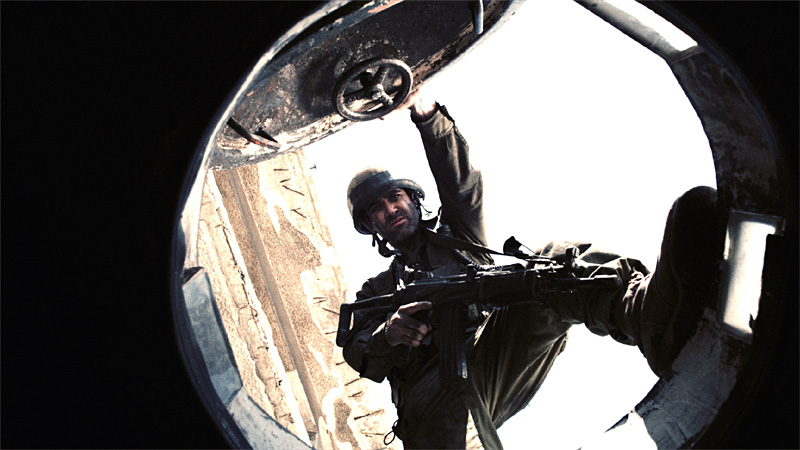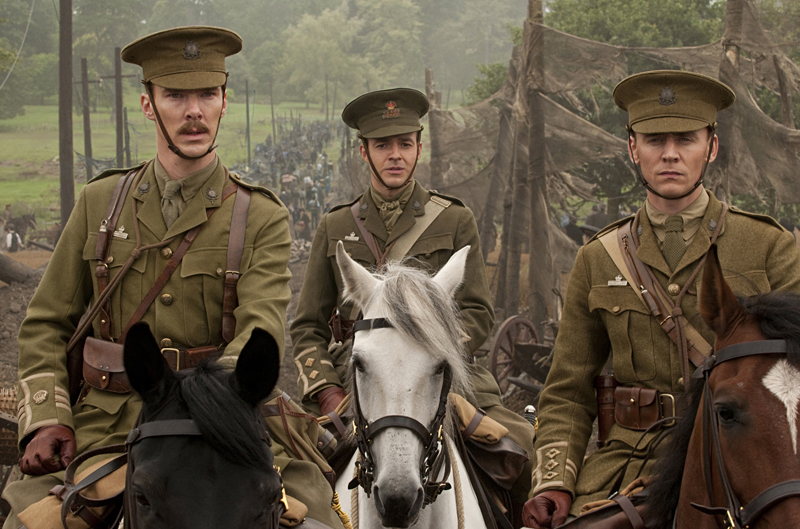Written and directed by Samuel Maoz, Lebanon is not just the year’s most impressive first feature but also the strongest new movie of any kind I’ve seen in 2010. Actually, Lebanon—which won the Golden Lion at Venice, after being rejected by Berlin and Cannes—hardly seems like a debut, perhaps because it’s based on a scenario Maoz had been replaying in his head for nearly 30 years.
It’s evident that the 1982 invasion of Lebanon, Israel’s fifth and least defensible war, has had a remarkable re-emergence in the nation’s film industry. Like Ari Folman’s groundbreaking animation Waltz With Bashir before it, Lebanon is a film by a traumatized veteran. But where Bashir is mainly concerned with the recollection of that trauma, Lebanon is predicated on restaging the traumatic event. Set, over the course of a 24-hour period, entirely inside an Israeli tank heading north on the war’s first day, Maoz’s cine-memoir is at once political allegory and existential combat movie—Sartre’s No Exit as directed by Sam Fuller.
Blunt, clamorous, and harrowing, Lebanon is also a formalist tour de force. As the Israeli soldiers never leave their tank, code-named Rhino, the movie is necessarily shot mainly in close-up and, except for the very end, all exteriors are scanned through the crosshairs of the tank’s bombsight. The outside world is heard through the tank’s steel plating or via crackling radio transmissions from distant headquarters. Individuals—a Syrian captive, a dying Israeli soldier, and, most often, the battle-hardened platoon leader Jamil—are intermittently lowered into, or lower themselves into, this moving dungeon. But for the four men inside, there is no escape.
Lebanon is pure cinema, although with its dramatic entrances and exits and constant ensemble chatter, it could have been staged as a play. The concept is unrelenting, but Maoz does take a few liberties in the service of his overall aesthetic strategy. Civilians occasionally stare directly into the bombsight; mayhem and casualties appear in fragmenting close-up. Still, this pragmatic stylization is invariably trumped by the emphasis on physical discomfort, constant stress, and unthinking panic.
Like the 1982 West German submarine drama Das Boot or Anthony Mann’s Men in War—but even more so—Lebanon is a movie about a particular condition, less a suspenseful narrative than an immersive experience. There is no space for anything but the present moment inside the tank. The men’s lack of training—or, more likely, its irrelevance—is made evident early, when the tank’s increasingly befuddled commander argues with his high-strung childhood buddy about whose job is more crucial and whose turn it is to stand watch. (That the commander is the stupidest member of the squad comes with the territory.) The tank’s driver responds negatively to pressure, while the newly assigned gunner, Shmulik (Yoav Donat), named for the filmmaker, proves unable to fire at a living target.
Shmulik’s paralysis results in at least one Israeli casualty (and this unnamed corpse becomes, for a time, the fifth inhabitant of the tank). Of course when Shmulik does, after much shaking, manage to squeeze the trigger next time, the results are appalling—although we will soon see worse, always through his eyes. (As the gunner, Shmulik has the only constant access to the bombsight.) The Israelis inflict brutal collateral damage on Lebanese civilians that is all the more appalling as a factor of their own fear.
As Rhino’s mission appears increasingly irrational, Lebanon‘s visceral naturalism verges on the surreal. The tank stalls in the middle of a bombed-out Syrian-controlled town, resting in front of a travel agency—glimpsed posters of the Eiffel Tower and World Trade Center accentuate the stasis. Rhino’s destination is named for a Riviera resort; reaching St.-Tropez, Jamil assures them, will be a simple “walk in the park.” The war is rendered additionally fantastic by the evocative euphemisms—helicopters are “angels,” a casualty is a “flower.” Mixed emotions are illustrated in another way when, in the movie’s lengthiest reference to life before the day-old war, Shmulik recounts a tale of adolescent sexual arousal developing out of a teacher’s attempt to comfort him in the wake of his father’s death.
Always on the verge of panic, the nervous soldiers frequently relieve themselves in a pan. Meanwhile, Rhino suffers its own stress; the tank drips oil and fills with detritus. Toward the end of the movie, the bombsight is cracked—as if in acknowledgment of a world beyond comprehension. Because none of the soldiers speak Arabic, they are oblivious to the dramatic confrontation between the ostensibly helpful Falangist, who is to guide them, and their Syrian prisoner. Harsh blasts of radio commands function as the voice of God—and well before the movie ends, God has abandoned them. Cramped, noisy, airless, and hot enough to boil piss, the tank is surrounded by invisible Syrians who set about terrorizing the Israelis by playing an eerie death tango. “I want to go home,” one wails. “I want my mom!”
For some, this outburst is the movie’s most disturbing aspect. What makes “the image of an Israeli soldier, agonizing and crying, so appealing to festival curators and audiences of the Western world?” one Israeli critic wondered. For all its international accolades, Lebanon‘s domestic reception has apparently been mixed. (Unlike Waltz With Bashir and Joseph Cedar’s Beaufort, also about the 1982 war, it did not win Israel’s equivalent of the Oscar.) Conservative commentators saw the movie as bad for morale; on the left, Lebanon has been criticized for identifying with Israeli soldiers and objectifying their Arab victims. But what does this mean? The Lebanese civilians are subject to far more gruesome suffering than the soldiers, while, in his justified hysteria, the Syrian POW inspires at least as much empathy as his Israeli captors. What Lebanon does not do is pretend to share any perspective other than that of Shmulik and his comrades.
Less “agonized and crying” than confined, confused, and utterly self-absorbed, the soldiers in Rhino are unwilling conscripts yearning for normality, ignorant of their enemy, misled by their superiors, and totally fixated on personal survival. Lebanon may be the movie’s title, but, blindly plowing through everything in its path, the beleaguered tank is Israel.








